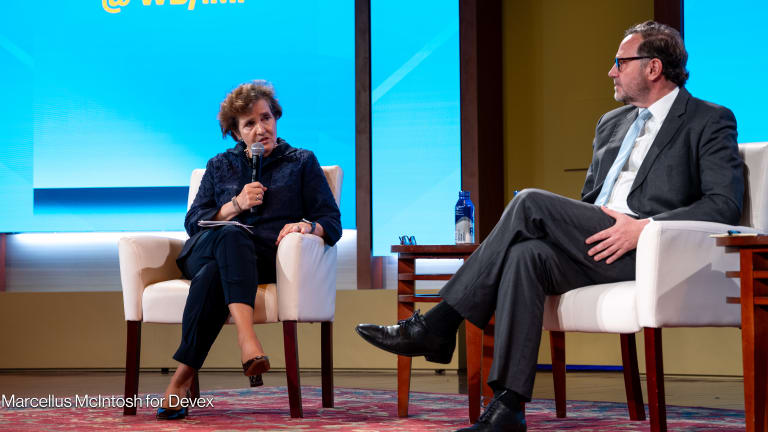Opinion: MCC has engaged in a $500 million compact with Nepal. Here's why.

The people of Nepal made history last year by participating in the country’s first elections since its constitution was adopted in 2015, including the first local elections in over 20 years. From the Terai plains to the terraced hills and high Himalaya, millions of citizens cast ballots for local, provincial, and national representatives. With around 70 percent of eligible voters exercising their democratic right to choose their own leaders, the people of Nepal sent a strong message that they are ready to usher in a new era of transparency, accountability, stability, and responsive governance. Nepal is now firmly on a path toward a decentralized federal system. Its new leaders should seize this moment to take steps to create greater economic opportunity for all Nepali citizens.
MCC signs $500M compact with Nepal to improve power, roads
On Thursday the Millennium Challenge Corp. and the government of Nepal signed a compact agreement, with the U.S. committing $500 million to support power transmission and road maintenance programs. The compact is MCC's first in South Asia and is seen as a signal of Nepal's progress toward democracy and good governance.
Years of economic and political instability have shaped the history of Nepal. Nepal is one of the poorest countries in Asia, with a quarter of the population living under the poverty line of $1.90 per day. Natural disasters, including the 2015 earthquakes and extreme flooding in 2017, killed thousands of people and pushed an additional million below the poverty line. Almost half a million people leave the country each year to look for jobs abroad. As a result, today, Nepal’s gross domestic product per capita is among the lowest in South Asia.
With a constitution in place and elections completed, Nepal has the potential to enter a period of political stability, one that can allow its leaders to prioritize creating an environment that supports economic growth and private investment. The recent signing of large energy projects that will bring in billions of dollars from the private sector is a needed boost. Fighting corruption is equally important, and by enhancing transparency in government decision making, prosecuting corrupt officials, joining the international Open Government Partnership, supporting media freedom and investigative journalism, and allowing civil society to thrive, Nepal’s new leaders can contribute to the creation of a climate that will attract investors.
As Nepal’s new leaders take office, they will have a unique opportunity to increase economic growth and enhance regional connectivity through partnership with the United States Millennium Challenge Corporation. Last September, MCC and the government of Nepal signed a compact to address systemic issues in the power and transport sectors. This compact is a $500 million U.S. grant investment matched by $130 million from the Nepal government that, when completed, will benefit 23 million people — about 80 percent of Nepal’s population.
Nepal’s economic development has been hampered by chronic electricity shortages, and new investments to address the inadequate supply of electricity are critical to achieving sustainable growth. The MCC compact specifically targets power and transport challenges because they are among the binding constraints to economic growth in Nepal. The projects include the construction of about 300 km of high voltage power lines — equivalent to one-third the length of Nepal — the addition of a second high-voltage crossborder transmission line with India, and activities to improve sector governance to promote private investment. Coupled with other investments in generation and distribution, the MCC compact will light Nepal’s bright future. It will also expand power trade in South Asia, among the least economically integrated regions in the world, promoting greater regional connectivity, cooperation, and integration.
Additionally, the compact will focus on road maintenance to support the movement of goods and people. Due to poor infrastructure and a challenging topography, Nepal has one of the highest costs of transport in the region. This includes a matching fund to maintain up to 300 km of roads and incentivize the government to allocate more resources for periodic maintenance. This will complement existing efforts by others to build new roads and, in the process, spur additional economic growth. It will also benefit the residents of local communities who will have better options for getting their goods to market.
As we lay the groundwork for the compact to enter into force, businesses are already benefiting from new opportunities to work in Nepal in areas such as design and engineering services, financial services, project management, and construction. Companies are seeing new potential for investing in Nepal, including business and trade opportunities for U.S. firms. A stable and economically vibrant Nepal promotes regional stability and security, benefiting the United States and the global community.
Once the new government is formed, Nepal’s leaders will be in charge of implementing this historic MCC compact and realizing its tremendous potential. This is a unique opportunity to systematically improve the lives of millions of Nepalis and unleash the country’s economic potential. MCC looks forward to working with Nepal’s leaders and its people in strong partnership as we promote greater prosperity for all Nepalis.
Search for articles
Most Read
- 1
- 2
- 3
- 4
- 5








